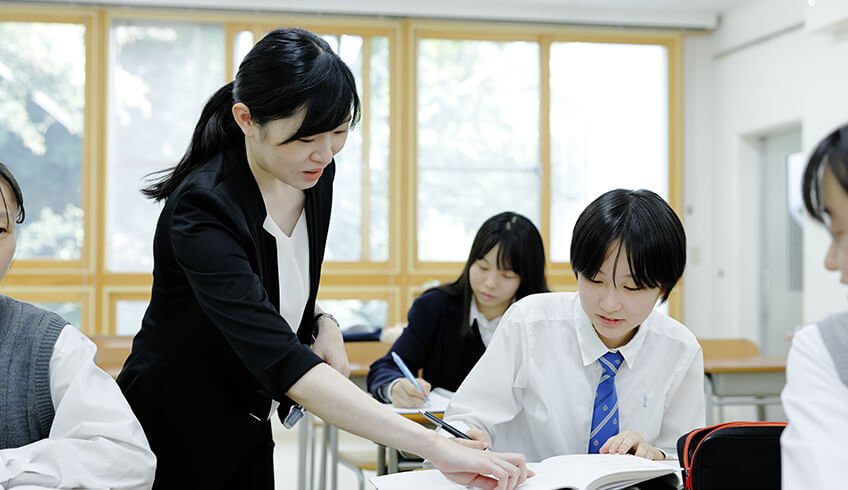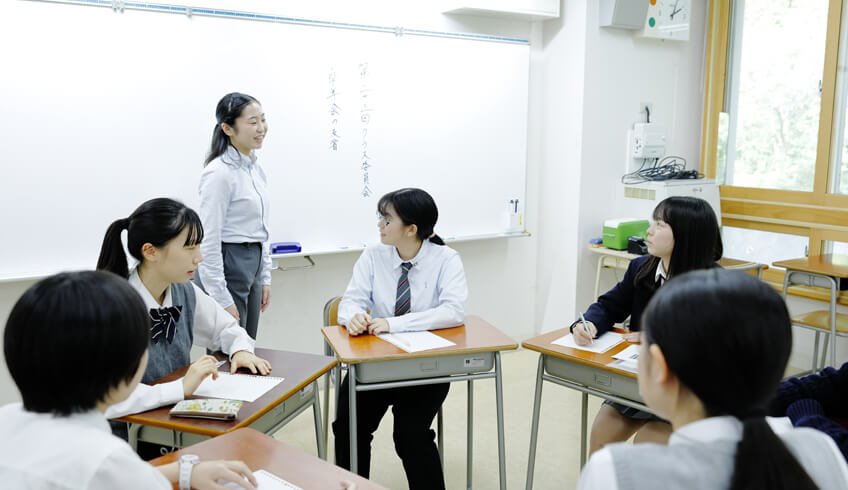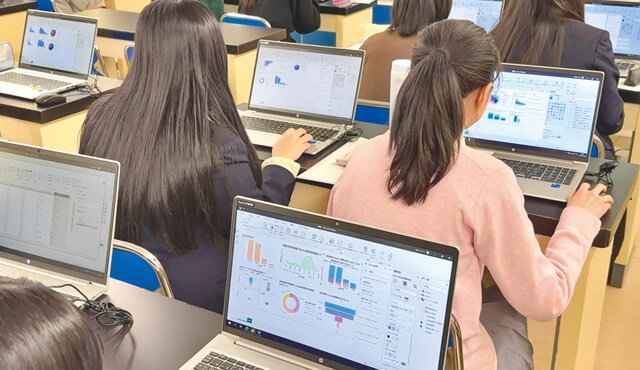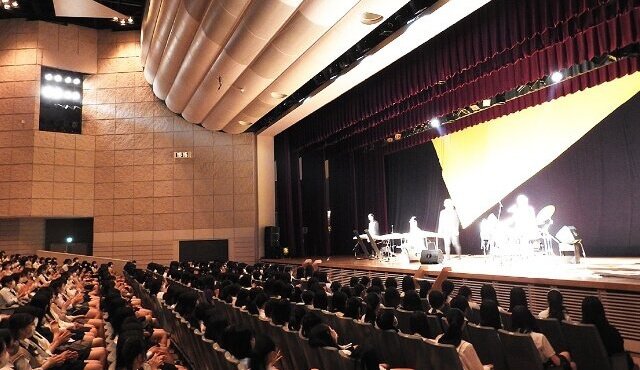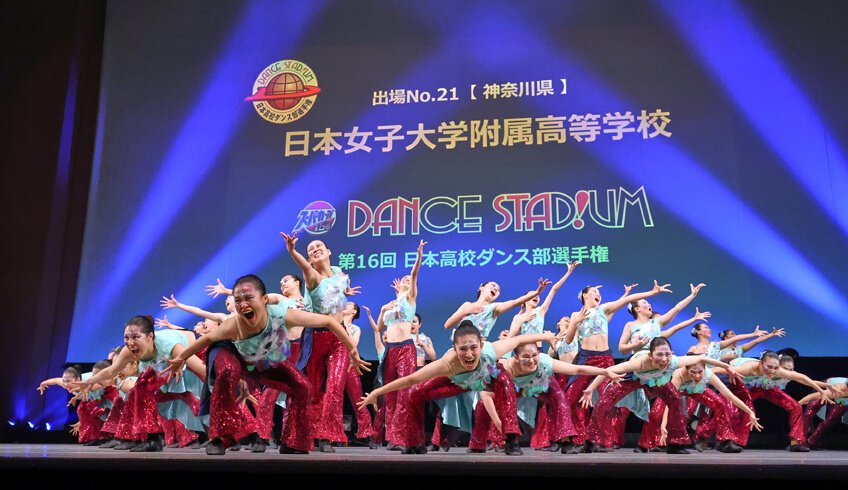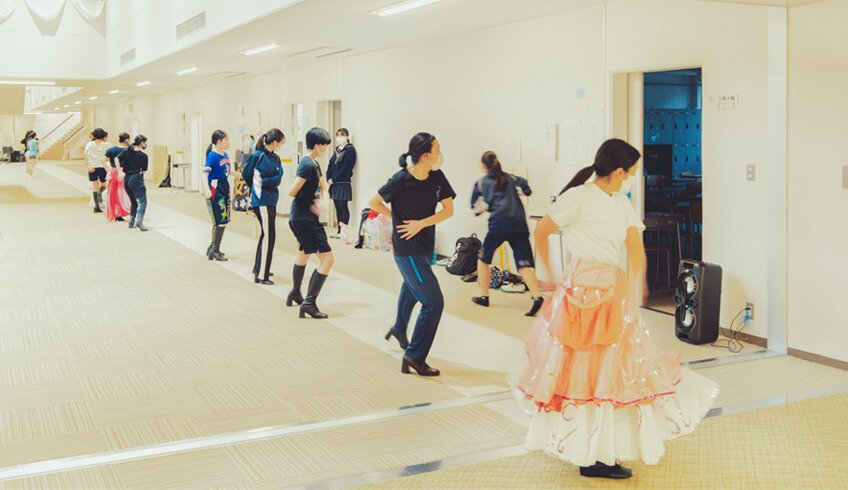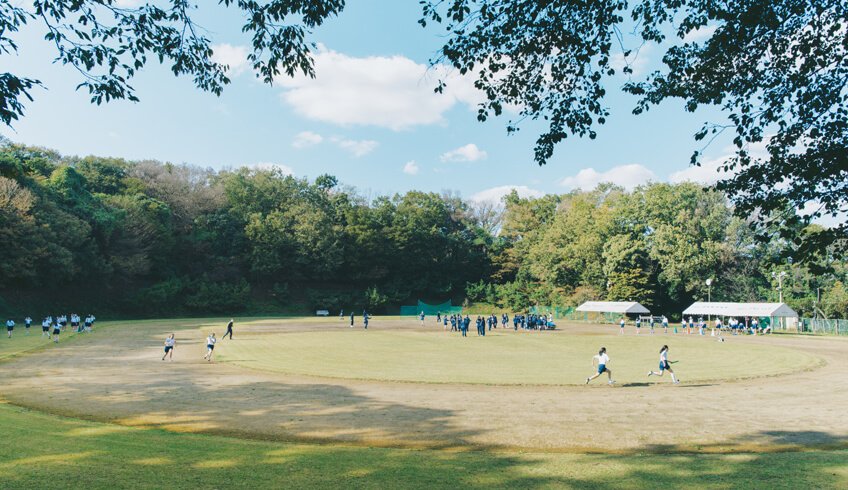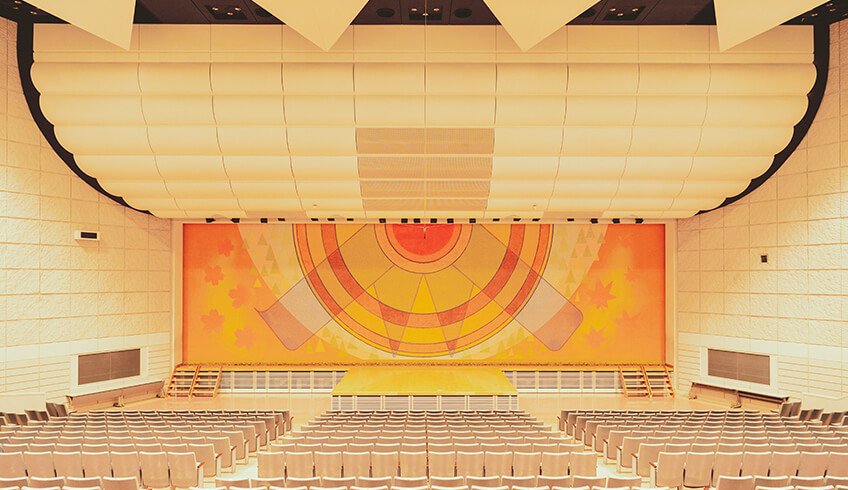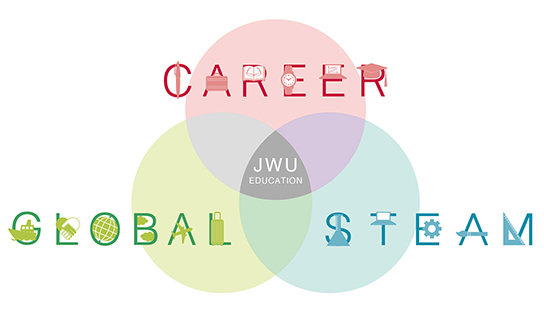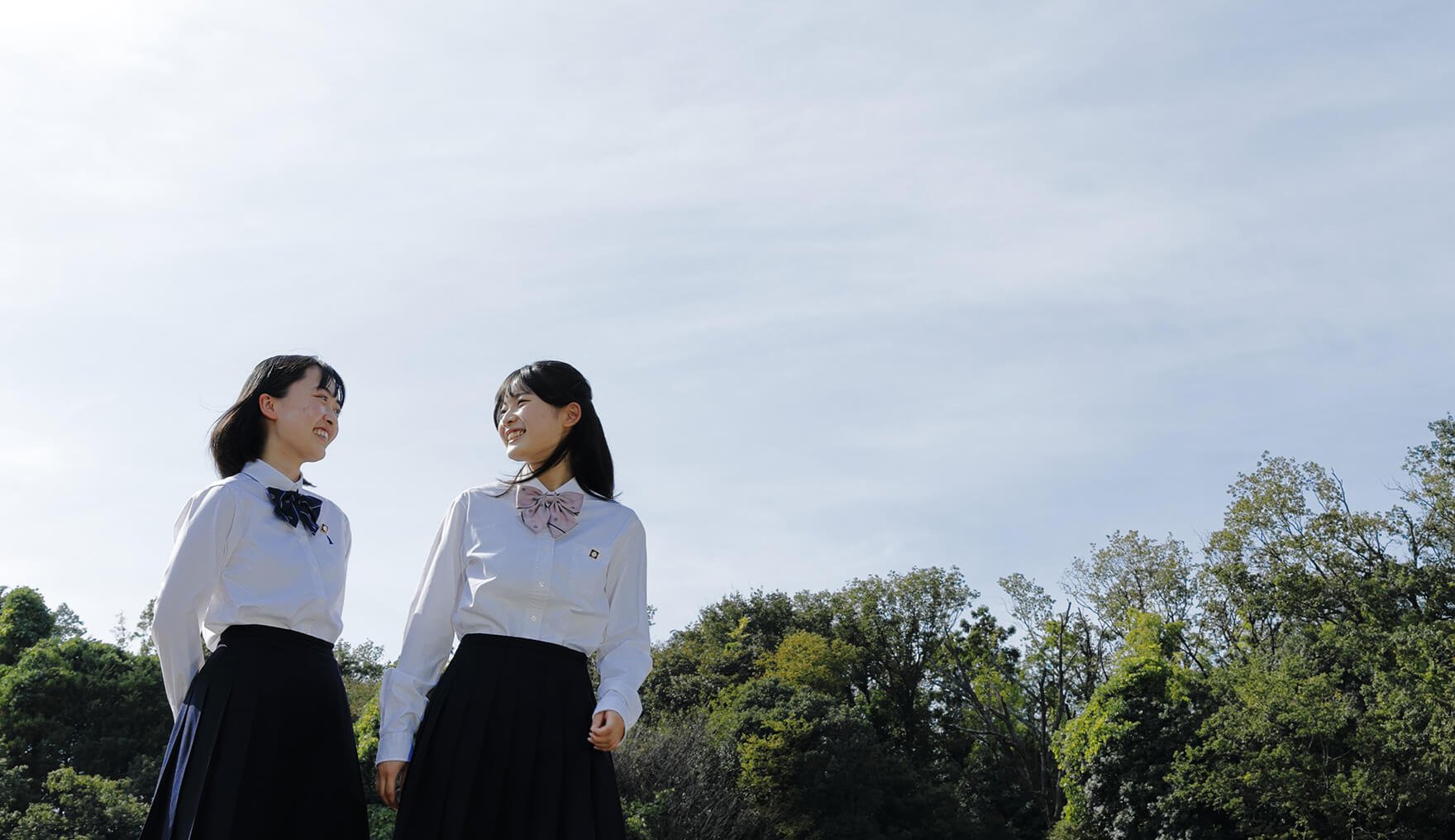
Educational policy
Learning activities
Through free and varied study opportunities, students can discover the joy of learning. A curriculum that does not divide students into arts or science courses broadens the scope of their future activities.
Self-governance activities
Every student is a member of the self-governance committee, which discusses, decides on, and implements everything from the management of school events to daily tasks.
Curriculum
The school's curriculum does not divide students into arts or science courses. The main focus is to enable students to learn all the subjects in each subject area evenly and to acquire a wide range of basic academic skills that they will need in whatever field they go on to in the future. Based on this curriculum, students choose their own classes from a wide variety of electives to deepen their studies.
Classes
Japanese
Based on the belief that understanding and mastering language enriches a person's life, the school nurtures excellent users of the Japanese language with the outstanding ability to think, express, and read and understand.
Geography, History and Civics
In order to respond to the internationalization and informatization of the times, students will deepen their international understanding while respecting diverse values, and acquire information processing skills to ascertain whether something is true or false.
Science
The school aims to enable all students to acquire a broad range of scientific thinking skills without being restricted by boundaries such as the arts and sciences. Classes emphasize real experience and incorporate many experiments and practical exercises, including observation of the nature-rich campus (ecological observation and investigation of herbaceous communities).
Distinctive education
STEAM education
ICT Education
On-campus Wi-Fi, PCs, and tablet devices are available for students to connect their own terminals, and are used in a variety of ways, from classes to self-governance activities. In addition, through intensive cross-subject classes centered on the Information classes, the school focuses on teaching data science, including the collection, analysis, and discussion of experimental data, as well as the enhancement of statistics classes.
ICT environment shared with JWU
Manaba (class support system), Microsoft365 and Zoom are used for regular classes, online classes, communication and meetings.
Career education through e-portfolio
The school aims to electronically store the results of daily learning of students and use them to help them design their college and later careers.
Global education
The school offers English e-learning materials for TOEIC and Eiken preparation. By working with individually optimized materials, students can greatly enhance their English proficiency skills. The school also offers three programs based on students’ requests.
Overseas language training
The school has been offering summer language training programs in New Zealand for more than 30 years. The program is designed to develop not only language skills, but also an international awareness and self-reliant mindset.
Domestic language training
Students can participate in online language training at the University of Stirling (UK) and TOEFL iBT test preparation courses. In addition, based on our agreement with Education New Zealand, the school offers a variety of programs.
International credit transfer system
For annual study abroad by AFS or YFU with a recommendation from the school principal, up to 32 credits during the study abroad period will be comprehensively accredited and the student can return to the same grade level as before departure.
Special classes/career education
To enable students to take ownership of their lives, to be aware of their social responsibilities and to lead healthy and prosperous lives, the school offers special classes apart from subject studies and aims to help students build a foundation for life. Three special classes offered are: “Life Design Education,” in which students envision their own future based on the lives of the alumni; “Citizenship Education,” in which students learn about the legal knowledge necessary to be good citizens from lawyers; and “Mental Health Education,” in which students learn about mental health from psychiatrists and psychology specialists.
Fountain of Knowledge/inquiry-based learning
We offer a course called “Chi no Izumi (Fountain of Knowledge),” in which students who want to expand their world and take a new step forward can freely participate according to their interests. With lecturers who are active in society, students can deepen their understanding of various issues in modern society, learn about topics in mathematics and the latest scientific research and technological developments that they would not normally have the opportunity to learn about, and improve their English proficiency and essay writing skills.
Senior High School - University Connection Program
Elective course student system
This is a system for the senior high school students to study with university students by taking designated courses offered by JWU. There are some courses that are recognized as “courses taken in advance of admission.”
Study abroad preparation program
Students can hear from seniors about their study abroad experiences and learn about English certification exams.
Spring seminar
During spring break, students can participate in an experience class offered by JWU and consider their career options for higher education.
Self-governance activities
“Think for ourselves and decide for ourselves.”
Many school events are planned and organized by students in various committees, providing an opportunity for students to demonstrate their abilities. Everyday tasks such as the closing meetings, cleanup, assemblies, and accounting are also managed by “sub-committees” organized by students. Through these self-governance activities, each and every student can feel involved in self-governance, which is a characteristic of the school's self-governance activities. There are also numerous opportunities for discussion, including school-wide committee meetings and high school life research seminars, where students listen to diverse opinions and grow together while respecting each other's views.
Club activities
The school has 40 clubs. Many students belong to clubs and are active in them, taking advantage of the spirit of self-governance. They hold training camps during long vacations to improve their skills and build deeper relationships with each other.
Annual events
- April: Opening ceremony, admission ceremony, new student orientation, all-school assembly and welcome party, founding anniversary (20th), health checkup
- May: Regional study fieldwork (3rd grade), school outing (1st and 2nd grades), sports day
- June: JWU departmental consultations (3rd grade), 1st semester midterm exams, anniversary of the birth of Jinzo Naruse (23rd), high school life research seminar, class observation day
- July: Art appreciation, JWU departmental information session (2nd grade), pre-summer vacation remarks, summer camp
- August: Overseas language training (New Zealand)
- September: post-summer vacation remarks, Karuizawa Seminar (2nd grade), special lecture by JWU faculty member (2nd grade)
- October: Semester-end exams, all-school assembly, 1st semester closing ceremony, 2nd semester opening ceremony, Momiji festival
- November: High school life research seminar, JWU faculty information session (1st grade)
- December: Preparatory exams, 2nd semester midterm exams, lecture by the library department, pre-winter vacation remarks, winter camp
- January: Post-winter vacation remarks, recommendation admission exams, Jinzo Naruse farewell lecture memorial day (29th), JWU departmental information session by graduates (2nd grade)
- February: Sports day, general admission exams, year-end exams
- March: Anniversary of Jinzo Naruse’s passing (4th), concert, all-school assembly and farewell party, graduation ceremony, semester-closing ceremony, spring training camp
Facilities
The school campus is located in a quiet and clean environment, surrounded by a vast forest, and features spacious facilities.
Momiji Theatre
Surrounded by school buildings and lined with ceramic chairs, this open-air theater is usually a place for relaxation, but is also used as a stage for performances and presentations.
Gymnasium
There are three gymnasiums, two large enough for basketball and another about three times larger.
School ground
Inside the 200m track is a grass field. Surrounded by green trees, the school grounds are very refreshing and students can experience the changes of the four seasons.

